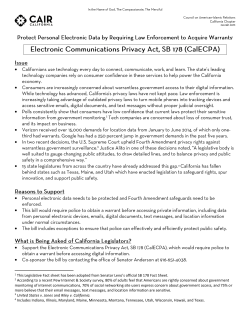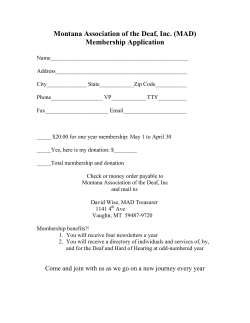
Introduction Even though foundation grants make up a small
Introduction Even though foundation grants make up a small percentage of annual health spending in the U.S., they can have a huge impact on health. By supplementing the private and government funding of healthcare, health research, and public health, foundation grants provide an important opportunity to implement new and innovative solutions to today’s health challenges. The impact of these grants, however, would be much less if organizations lost current funding from other sources when they received a new grant from a foundation. For this reason, MHCF funds should not be used to supplant other sources of funding. Moreover, according to Montana law, MHCF funds may not be used to supplant government funds. This brief explains MHCF’s requirements to prevent supplanting of other sources of funds. Background The Montana Healthcare Foundation (MHCF) was established in 2013 as the private foundation to receive the proceeds of the Blue Cross Blue Shield of Montana sale pursuant to the Montana Health Entity Conversion Statute (Mont. Code Ann. 50-4-701 et. seq.). MHCF’s purpose is to conduct charitable, scientific, and educational activities that improve the healthcare and health of all Montanans. MHCF will annually provide between $2 million and ultimately as much as $8 million in grants and related charitable activities. As such, MHCF represents an important new resource to address the health problems facing Montanans. Pursuant to Section 50-4-720(1)(c), M.C.A., MHCF funds may not be used to supplant government funds. Federal, tribal, state, and local government funds make up a large and essential component of health system funding in Montana, as in all states. For example, government agencies such as local, state, and tribal health departments control the spread of communicable diseases, and provide disease prevention programs, restaurant and water inspections, and other essential services using state and local government funds and federal grants. The University of Montana and Montana State University, community colleges, and tribal colleges rely on state and federal grants and other government funding to conduct health research and develop community-focused programs to address identified needs. Non-governmental entities such as non-profit hospitals, mental health centers, community health centers, and others receive state funding, federal grants, and revenue from state and federal insurance programs to provide medical services. These and other government-funded healthcare and health research activities make up a large and critically important part of the health system that serves Montanans. If the availability of MHCF funds were to lead to decisions that reduce the other resources that are currently available for Montanans’ health, MHCF’s impact would be lessened. MHCF’s investments will yield the maximum returns if they supplement, rather than supplant, programs and services that are already in place, and those that have other potential sources of funding. For this reason, MHCF will implement grantmaking practices to ensure that MHCF funds do not supplant other sources of funding, but are instead used to supplement or enhance present levels of funding. Supplanting could, in theory, occur under a number of circumstances, for example: - - A grant from MHCF could be used by a government agency, university, or non-profit organization to replace government funds that support an existing program, facility, or service. A grant or the potential for a grant from MHCF could be used by a government agency or elected officials as justification for withdrawing funding for an existing program, facility, or service. The potential for a grant from MHCF could be used by a government agency or elected officials as a reason not to fund a proposed new program, facility, or service. A grant or the potential of a grant from MHCF could lead non-governmental funders to decide not to fund a new program or to de-fund a current program. Practices to avoid supplanting government funds To prevent supplanting of government funds in these and other instances, MHCF implements the following practices during the grant application, grantmaking, and grant management process: Before a grant application is invited or accepted: MHCF educates stakeholders regarding the requirement for MHCF funds to supplement, rather than supplant, other sources of funding. During the grant application process: 1. We require that MHCF funds be used to support new work or to expand in specific ways upon currently funded work. To receive grant funding, organizations apply will be asked to demonstrate that the work to be carried out is either: o A new program, facility, or service that has not been previously funded by a government agency, or o An expansion of an existing program, facility, or service that is currently funded by a government agency but for which the proposed grant will accomplish specific health objectives that cannot be achieved with the current level of funding. 2. We require that applicants for MHCF funds: o Verify that no other sources of funding are available for the proposed activities, or o Disclose any other potential sources of funding, and verify that the award of MHCF funds will not cause these funds to be reduced or withdrawn, and o Provide a budget and budget narrative that include other sources of funding for related activities and detail how MHCF funds will be used in a way that supplements any other funding that may contribute to the proposed project. Grant provisions and grant management: MHCF grantees will sign grant agreements that provide MHCF the authority to oversee implementation of each grant-funded activity, and allow MHCF to rescind grant funds if the terms of the grant agreement are not fulfilled. Specific provisions to prevent supplanting will be included in each grant agreement, including: - - - Grantees must represent and warrant that the activities to be carried out using MHCF funds are not mandated by law, and that government appropriated funds will not be decreased or diverted for other uses because of the availability of these funds. Grantees must represent and warrant that MHCF funds shall be used only to supplement and, to the extent practical, increase the level of funds that would be made available from governmental sources. The grant agreements will also require that a grantee must return the MHCF grant funds in the event that (a) a grantee uses any of the funds for any purpose other than the specific work to be conducted as identified in the agreement unless such use is approved as a modification of the grant agreement and does not supplant government funds, or (b) if other governmental sources of funding for the proposed work become available during the term of the grant. MHCF will actively manage each grant to ensure compliance with these provisions. Grant management activities will include: regular phone calls, periodic site visits, and review of required semiannual budget and narrative reports. Such reports must include enumeration of any changes in funding available for the activities to be carried out under the grant.
© Copyright 2025










